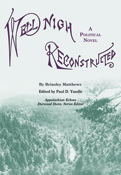Well-Nigh Reconstructed
A Political Novel

In 1882, William Simpson Pearson, writing under the pseudonym Brinsley Matthews, published Well-Nigh Reconstructed, a thinly disguised autobiographical novel excoriating the enormous societal changes that had beset the former Confederacy during Reconstruction. Pearson’s work was especially notable in that the author was a onetime Radical Republican and supporter of Ulysses S. Grant’s bid for the presidency. A product of Pearson’s perception that northern Reconstruction policies had devastated his native North Carolina, the book set in motion a genre of politically motivated novels that would culminate near the turn of the twentieth century with Thomas Nelson Page’s Red Rock and later Thomas Dixon Jr.’s infamous The Clansman.
Though set in Virginia and Alabama, it is clear that Well-Nigh Reconstructed drew heavily on Pearson’s own experiences and that it was conceived as a direct response to A Fool’s Errand, a pro-Reconstruction novel by fellow North Carolinian Albion Tourgée. Echoing Pearson’s own disillusionment with the Radical Republicans, the novel’s protagonist, Archie Moran, comes to see Radical Reconstruction as an attempt to turn the South into a carbon copy of the North, and through a series of encounters involving corrupt carpetbaggers, greedy politicians, and the Klan trials of the late 1870s, Moran grows weary of politics altogether and resigns his Republican Party affiliation. For Pearson and his doppelganger, Moran, Reconstruction became a vast breeding ground for corruption.
Featuring an extensive introduction by historian Paul D. Yandle, who sets the political and regional scene of Reconstruction North Carolina, this reissue of Well-Nigh Reconstructed will shed new light on the ways in which sectionalism, regionalism, and the embrace of white supremacy tended to undermine the recently reconstituted Union among Appalachian residents.
